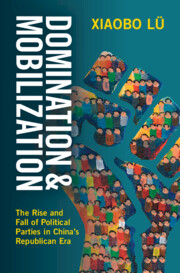Book contents
- Domination and Mobilization
- Domination and Mobilization
- Copyright page
- Dedication
- Contents
- Figures
- Tables
- Acknowledgments
- 1 The Reversal of Fortune of Revolutionary Parties
- 2 A Theory of Party Building by Revolutionary Parties
- 3 Prewar Resource Mobilization (1921–1937)
- 4 Reversal of Fortune
- 5 The CCP
- 6 Mao’s Rise and the Birth of a Strong Party (1935–1945)
- 7 The KMT
- 8 The Legacies of Party Building in China and Beyond
- Appendices
- References
- Index
1 - The Reversal of Fortune of Revolutionary Parties
Published online by Cambridge University Press: 11 June 2025
- Domination and Mobilization
- Domination and Mobilization
- Copyright page
- Dedication
- Contents
- Figures
- Tables
- Acknowledgments
- 1 The Reversal of Fortune of Revolutionary Parties
- 2 A Theory of Party Building by Revolutionary Parties
- 3 Prewar Resource Mobilization (1921–1937)
- 4 Reversal of Fortune
- 5 The CCP
- 6 Mao’s Rise and the Birth of a Strong Party (1935–1945)
- 7 The KMT
- 8 The Legacies of Party Building in China and Beyond
- Appendices
- References
- Index
Summary
This chapter lays out the central puzzle – the reversal of the fortunes of the Chinese Communist Party (CCP) and the Kuomintang (KMT) during the Republican Era. I contend that the emergence of a dominant leader aided the CCP’s ascension, whereas the contested leadership undermined the KMT. I first position the puzzling political development of the CCP and KMT within the framework of prevailing arguments in studies of authoritarian parties and Chinese politics, revealing that they are inadequate to explain the rise of the CCP and the demise of the KMT. I then succinctly recapitulate the key arguments of Domination and Mobilization, underscoring its unique contributions to three strands of scholarly discourse: the genesis of authoritarian parties, party-building by political organizations aims to seize power through nonelectoral means, and the rise of Communist movement in China. I conclude the chapter by outlining the plan for the book.
Information
- Type
- Chapter
- Information
- Domination and MobilizationThe Rise and Fall of Political Parties in China's Republican Era, pp. 1 - 30Publisher: Cambridge University PressPrint publication year: 2025
